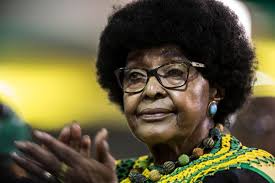Winnie Madikizela-Mandela, South African anti-Apartheid Campaigner, aged 81, died Monday.
Ms Mandela hallowed place in the pantheon of South Africa’s liberators was eroded by scandal over corruption, kidnapping, murder and the implosion of her fabled marriage to Nelson Mandela, died early Monday in Johannesburg. She was 81.
Her death, at the Netcare Milpark Hospital, was announced by her spokesman, Victor Dlamini. He said in a statement that she died “after a long illness, for which she had been in and out of hospital since the start of the year.”
The South African Broadcasting Corporation said she was admitted to the hospital over the weekend complaining of the flu after she attended a church service on Friday. She had been treated for diabetes and underwent major surgeries as her health began failing over the last several years.
Charming, intelligent, complex, fiery and eloquent, Ms. Madikizela-Mandela (Madikizela was her surname at birth) was inevitably known to most of the world through her marriage to the revered Mr. Mandela. It was a bond that endured ambiguously: She derived a vaunted status from their shared struggle, yet she chafed at being defined by him.
Ms. Madikizela-Mandela commanded a natural constituency of her own among South Africa’s poor and dispossessed, and the post-apartheid leaders who followed Mr. Mandela could never ignore her appeal to a broad segment of society. In April 2016, the government of President Jacob G. Zuma gave Ms. Madikizela-Mandela one of the country’s highest honors: the Order of Luthuli, given, in part, for contributions to the struggle for democracy.
Ms. Madikizela-Mandela retained a political presence as a member of Parliament, representing the dominant African National Congress, and she insisted on a kind of primacy in Mr. Mandela’s life, no matter their estrangement.
Nomzamo Winifred Zanyiwe Madikizela was born to a noble family of the Xhosa-speaking Pondo tribe in Transkei. Her first name, Nomzamo, means “she who must endure trials.”
Her birth date was Sept. 26, 1936, according to the Nelson Mandela Foundation and many other sources, although earlier accounts gave the year as 1934.
Her father, Columbus, was a senior official in the so-called homeland of Transkei, according to South African History Online, an unofficial archive, which described her as the fourth of eight children. (Other accounts say her family was larger.) Her mother, Gertrude, was a teacher who died when Winnie was 8, the archive said.
As a barefoot child, she tended cattle and learned to make do with very little, in marked contrast to her later years of free-spending ostentation. She attended a Methodist mission school and then the Hofmeyr School of Social Work in Johannesburg, where she befriended Adelaide Tsukudu, the future wife of Oliver Tambo, a law partner of Mr. Mandela’s who went on to lead the A.N.C. in exile. She turned down a scholarship in the United States, preferring to remain in South Africa as the first black social worker at the Baragwanath hospital in Soweto.
However, tributes have started pouring in for her. In a televised address President Cyril Ramaphosa – whom Mrs Madikizela-Mandela praised earlier this year – called her as a “voice of defiance” against white-minority rule.
“In the face of exploitation, she was a champion of justice and equality,” he said on Monday.
“She as an abiding symbol of the desire of our people to be free.”
President Muhammadu Buhari of Nigeria described her as “a courageous woman.”
Retired archbishop and Nobel laureate Desmond Tutu said she was a “defining symbol of the struggle against apartheid.”
“Her courageous defiance was deeply inspirational to me, and to generations of activists,” he added.
Energy Minister Jeff Radebe, reading out a statement on behalf of the family, paid tribute to “a colossus who strode the Southern African political landscape”.
“As the ANC we dip our revolutionary banner in salute of this great icon of our liberation struggle,” he said.
“The Mandela family is deeply grateful for the gift of her life and even as our hearts break at her passing we urge all those who loved her to celebrate this most remarkable South African woman.”
Gwede Mantashe, African National Congress (ANC) chairperson said: “With the departure of Mama Winnie, [we have lost] one of the very few who are left of our stalwarts and icons. She was one of those who would tell us exactly what is wrong and right, and we are going to be missing that guidance.”

